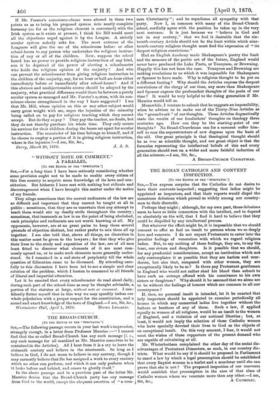"WITHOUT NOTE OR COMMENT." A PARALLEL.
[TO THE EDITOR OF THE " SPBCITITOR.1 SIR,—For a long time I have been seriously considering whether some provision ought not to be made to enable every citizen of this free country to acquire some knowledge of its laws and con- stitution. But hitherto I have met with nothing but ridicule and discouragement when I have brought this matter under the notice of my friends.
They allege sometimes that the merest rudiments of the law are so difficult and important that they cannot be taught at all in public ; sometimes, that they are so uncertain that any attempt to teach them would stir up deadly strife throughout the country ; sometimes, that inasmuch as law is on the point of being abolished, such principles and rudiments are not worth knowing at all. My opponents, however, are at no great pains to keep these several grounds of objection distinct, but rather prefer to mix them all up together. I am also told that, above all things, no discretion in this matter must be given to the lawyers ; for that they who give their lives to the study and exposition of the law, are of all men least fitted to discover what elements of it are most com- monly agreed on, or to make such elements more generally under- stood. So I remained in a sad state of perplexity till the whole question of Education came to be discussed. By attending care- fully to this discussion I have been led to see a simple and clear solution of the problem, which I hasten to commend to all friends of liberal and impartial education.
Let it be enacted that every schoolmaster do read aloud daily, during such part of the school-time as may be thought advisable, a portion of the statutes at large, without note or comment. I con- fidently flatter myself that in this way we may speedily imbue our whole population with a proper respect for the constitution, and a sound and exact knowledge of the laws of England.—I am, Sir, &c.,


































 Previous page
Previous page